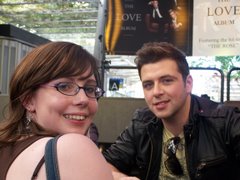 Her Majesty, Queen Elizabeth the Second, seems to be as far elevated above our consciousnesses as her position is elevated above our own. An aging woman commanding a decomposing system of rule, she is the mother of a cowardly weasel of a prince and the wife of an adulterous geriatric.
Her Majesty, Queen Elizabeth the Second, seems to be as far elevated above our consciousnesses as her position is elevated above our own. An aging woman commanding a decomposing system of rule, she is the mother of a cowardly weasel of a prince and the wife of an adulterous geriatric.Yet director Stephen Frear and writer Peter Morgan’s version of The Queen is imbued with such heart, depth and – dare I say it – wit, that it is impossible not to find virtue in her.
Primarily chronicling the week following the death of Princess Diana, the film presents a side of the titular Queen (Helen Mirren) previously unseen by such lowly commoners as ourselves.
Through her strained dealings with new Prime Minister Tony Blair and her interactions with family (Sylvia Syms is both charming and affecting as the Queen Mother) and the press, we are able to see the trials involved in maintaining such stoic dignity. Mirren’s performance is subdued and nuanced, creating ranges of heartfelt emotion with the simple twitch of an eyebrow or the fall of a foot.
The performance of Michael Sheen as Tony Blair is equally commendable, his uncanny resemblance to the Prime Minister only the starting point of a triumphant and sensitive performance.
While there is no way to verify the accuracy of the events, the film stands on its own as an affecting story of dignity and restraint in the face of accusation, propaganda, and the potential wickedness of politics, not to mention the feeling of helplessness when one realises one may not be as understanding of her world as one once thought.
Another strength of the film is its refusal to take sides. Every character has his or her own reasons for acting, and their own benefits to gain and advantages to lose. Tony Blair is no less a person than Her Majesty, simply the flipside of a spinning coin, and those caught in the wake of the events are drawn with sensitivity, regardless of which way they would like the coin to fall.
Its power draws from its unrelenting intent to present the story of a lady in crisis, her world thrown into sudden turmoil, and is, overwhelmingly, a success.

4 comments:
very good :) i really liked this one. To the point where i might even buy it, it was...just...REALLY good.
Popular perception holds Charles as a "weasel" and the Royals as cold and heartless, but it's more complicated than that.
The one character not developed in this film was that of Diana herself. While the "people's princess" remains the icon of superficial popular culture, the Royal family knew a very different, darker character behind the facades of glamour and pseudo-compassion.
Both Diana and her brother, Charles Spencer, suffered from Borderline Personality Disorder caused by their mother's abandoning them as young children. A google search reveals that Diana is considered a case study in BPD by mental health professionals.
For Charles Spencer, BPD meant insatiable sexual promiscuity (his wife was divorcing him at the time of Diana's death). For Diana, BPD meant intense insecurity and insatiable need for attention and affection which even the best husband could never fulfill.
Clinically, it's clear that the Royal family did not cause her "problems". Rather, Diana brought her multiple issues into the marriage, and the Royal family was hapless to deal with them.
Her illness, untreated, sowed the seeds of her fast and unstable lifestyle, and sadly, her tragic fate.
But I argue that Diana as a character didn't need to be developed. The film was seen through the eyes of the Queen, and through the eyes of Tony Blair. Therefore, it was their ideas of her, and the public/media's ideas of her that were most important in telling the story.
While those things about Diana are interesting, they had no place in the narrative.
Diana didn't matter as a person in this film - it was her effect on other people and her power as an entity that was important. Any unnecessary story focused on her specifically would have taken away the focus on the main characters.
And she wasn't a main character, simply a catalyst.
You're right that Diana was not the main character, but merely the context. And to have developed the character of the "real" Diana would have taken a whole separate film.
Still, the conflict in the film comes across as limited to the "emotionally repressed, tradition-bound Royals" versus "emotionally expressive, modern PM and public".
My point was that to really see through the eyes of the Queen, the film would have had to included the Royal's whole range of personal and ambivalent emotions towards Diana.
Otherwise, I think this is a brilliant film in every way.
Post a Comment